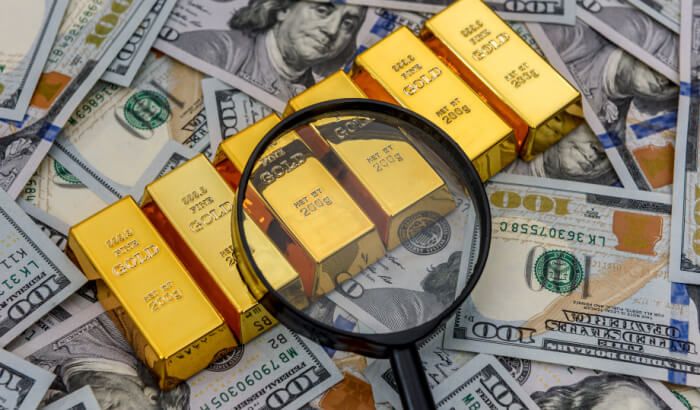
Tuesday Oct 3 2023 06:29

7 min

The price of gold dipped below $1,850 per ounce on Monday, reaching their lowest point in seven months, as continued strength in the U.S. dollar (USDX) and elevated yields on U.S. Treasury bonds have kept mounting pressure on the yellow metal.
Investors are evaluating the possibility of a “higher for longer” interest rate scenario materialising in the U.S. after the Federal Reserve sent a hawkish signal to the market during its September policy meeting. Although it kept the federal funds rate unchanged within the 5.25%-5.5% range, it said a potential interest rate hike before the end of the year is on the cards. Some commentators called the move a “hawkish pause” — or even a “hawkish skip.”
According to CME's FedWatch tool, traders are currently pricing in a 55% chance that the Federal Reserve will leave interest rates unchanged this year.
Elevated interest rates increase the opportunity cost of holding gold, which doesn't yield interest, diminishing its attractiveness as an investment.
Recent data revealed that the core PCE price index — the Fed’s preferred inflation gauge — saw a smaller-than-anticipated increase in August.
On a separate note, the U.S. economy maintained a reasonably robust growth rate of 2.1% in the second quarter. Investors are now focusing on key U.S. jobs data scheduled for release this week, which will provide further direction for the market.
The price of gold has shed close to 5.5% over the past month, breaching the $1,900 mark in late September. After surging above the key of $2,000-per-ounce threshold in early May, gold prices have slid by over 11% — a decrease of $230 — on pressure from U.S. Treasury yields.
According to economists at TD Securities recently cited by FXStreet, risks are very much to the downside for the commodity:
In their gold price outlook shared on September 29, strategists at Frankfurt-headquartered Commerzbank said XAU was unlikely to regain any significant ground in the near future:
Jim Wyckoff, senior analyst at Kitco Metals, told Reuters that the yellow metal could breach the $1,800 level in the near future, as currency trends are typically long-lasting:
"There is a reckoning that interest rates are going to be higher for much longer, which has been the bearish element in the precious market. Gold prices could go below $1,800 in the near-term. Trends in the currency markets tend to be stronger and longer lasting. The appreciation of the U.S. dollar may not end anytime soon, pressuring the gold market."
Analysts at Melbourne-based bank ANZ were highly bullish on the gold price in a comment on September 27, saying it could rise to $2,000 by the end of 2023:
The bank issued another comment several days later, saying it saw potential for the “strategic buying” of the commodity around the $1,850 level:
The gold price forecast shared by economic data aggregator TradingEconomics was moderately bullish, seeing the commodity trading at a potential average of $1,869.26 per troy ounce by the end of this quarter. The platform’s 12-month gold projection estimated it to trade at $1,933.95 by early October 2024.
The front-month gold futures contract on the NYMEX was trading at $1,836.00 at the time of writing, as per MarketWatch data.
When considering gold and other commodities for trading and price predictions, remember that trading CFDs involves a significant degree of risk and could result in capital loss. Past performance is not indicative of any future results. This information is provided for informative purposes only and should not be construed to be investment advice.
